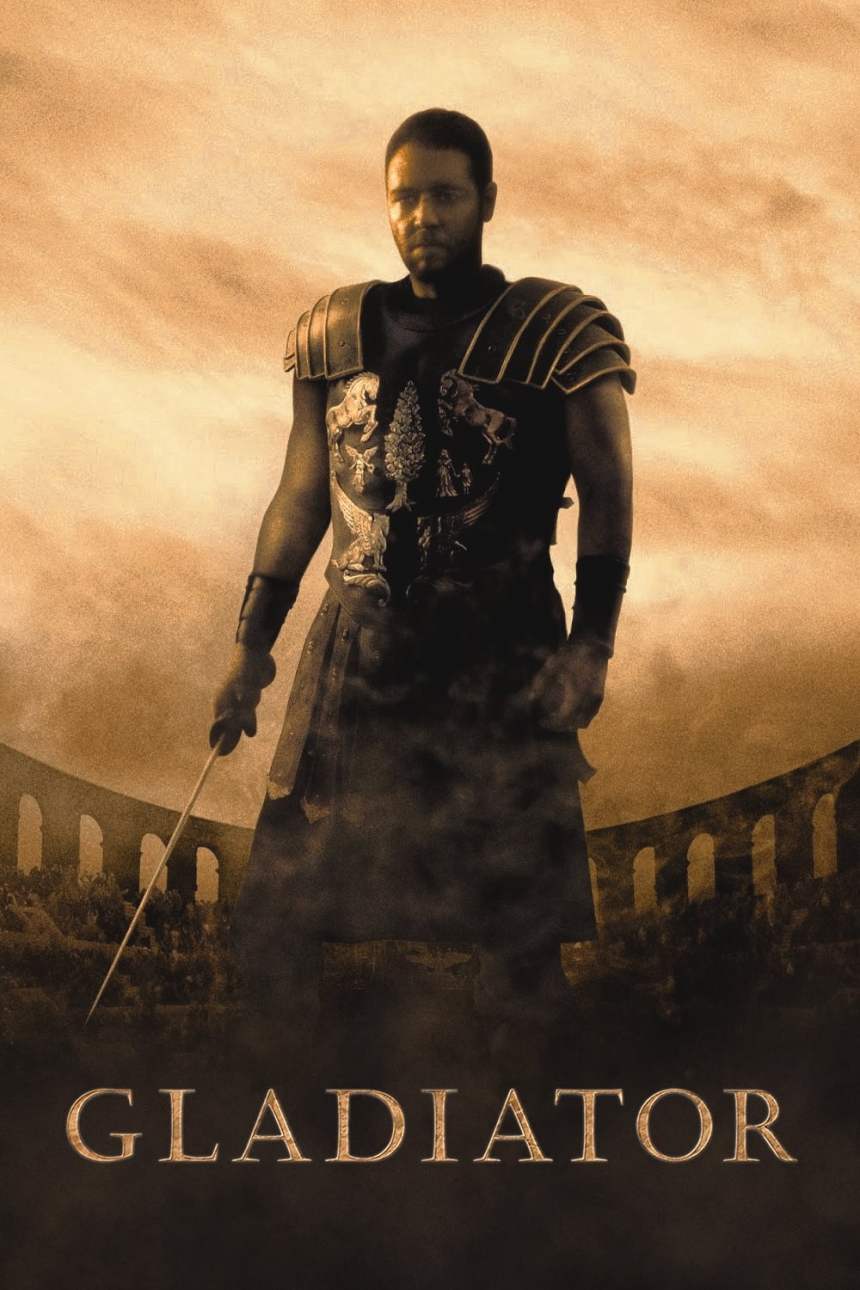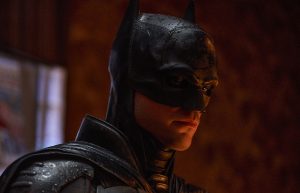
The general who became a slave. The slave who become a gladiator. The gladiator who defied an emperor. Striking story! But now, the people want to know how the story ends. Only a famous death will do. And what could be mor glorious than to challenge the Emperor himself in the great arena?” as Jason’s Movie Blog’s goes back to Ancient Rome to revisit the historical blockbuster epic in the “cinematic flashback” review for 2000’s Gladiator.
GLADIATOR
“The general who became a slave.
The slave who became a gladiator. The gladiator who defied an empire”
Director: Ridley Scott
Writer: David Franzoni, John Logan, and William Nicholson
Starring: Russell Crowe, Joaquin Phoenix, Connie Nielsen, Derek Jacobi, Djimon Hounsou, and Richard Harris
Run Time: 155 Minutes
Release Date: May 5th, 2000
Rated: R
THE STORY
General Maximus Decimus Meridias (Russell Crowe) has won the love of his soldiers and brother-in-arms, with his latest campaign defending the glory of Rome’s empire from invaders. He also has the love of Rome’s Emperor, Marcus Aurelius (Richard Harris), who sees Maximus as a natural born leader and wishes for him to succeed him as ruler of Rome, so that rule might pass from the Caesars back to the people and Senate. Before fully compilating fully gravitas of his emperor’s dying wish, Marcus Aurelius passes away and his neglected and power-hungry son, Commodus (Joaquin Phoenix), has other ideas and his own ambitions to follow. Escaping an ordered execution, Maximus hurries back to his home in Spain, too late to save his wife and son from the same order. Taken into slavery and trained as a gladiator by Proximo (Oliver Reed), Maximus lives only that he might someday take his revenge and fulfill the dying wish of his emperor. The time soon comes when Proximo’s troupe is called to Rome to participate in a marathon of gladiator games held at the behest of the new emperor, Commodus. Once in Rome, Maximus wastes no time in making his presence known and is soon involved in a plot to overthrow the emperor with his former-love Lucilla (Connie Nielsen), Commodus’ sister, after whom he lusts, and also the widowed mother of Lucius (Spencer Treat Clark), heir to the empire after his uncle, and democratic-minded senator, Gracchus (Derek Jacobi). As all the players shift and maneuver towards their ultimate endgame plans, a clash of wills and strength ring across the heart of Rome as Maximus inches ever closer to exacting his revenge against Commodus, hoping to honor the late emperor’s wish of freeing Rome.
MY THOUGHTS
Given the amount of coverage and anticipation being made for Gladiator II, I decided to go back to the original Gladiator film and to see what I liked about it. There is no doubt about it that Gladiator has made its mark on cinema history, with director Ridley Scott presenting a feature film that is quite a memorable hit. I remember I did not see this movie in theaters and actually first watched it when it came to rental at my local blockbuster (yes, that long ago) and I was immediately blown away at it. It still remains true classic of the 2000s and justly so. So, with the new movie coming out, I decided to go back and revisited why Gladiator is widely considered a true timeless cinematic piece.
Gladiator is directed by Ridley Scott, who proved to be quite an effective director for producing such memorable projects such as Alien, Blade Runner, and 1492: Conquest of Paradise. The scale of the feature is perhaps were Scott’s talent are mostly utilized in the correct way, with the director envisioning a grand “old school” Hollywood historical epic that hasn’t been done in many years (at the point in time); shaping a motion picture to encapsulate such a notion wonderfully. The staging and orchestrating everything throughout is credited to Scott’s clear sight of what he wanted the movie to be…..and it’s all for the better in that regard. Naturally, the story of the feature is quite compelling, with a classic revenge story for Gladiator’s plot, but wrapped together with a sweeping epic that’s filled with drama and action and having a grand backdrop of being set within Ancient Rome. The script, which was penned by David Franzoni, John Logan, and William Nicholson, weave together a compelling tale of drama and vengeance with plenty of fanciful dialogue moments that have become inconic / memorable to quote (i.e. Maximus’s speech). Of course, the film’s action is where the movie shines the best, with Scott delivering and executing several intense moments of gladiatorial fights and battle sequences that showcase the movie’s large scope and grandeur. It’s all well-choreographed the correct way and the presented in a way that entices viewers with its excitement and entertainment. Basically, everything about the movie was incredible and definitely I consider Gladiator as one of Ridley Scott’s best films to date.
For a production presentation standpoint, Gladiator is an absolutely gorgeous film that still (to this day) looks visually stunning for the eyes. Immersed with scale and scope and incredible details, the film’s background and overall “look and feel” felt elaborate and appropriate for a big-budgeted studio endeavor (again, something reminiscent of “Old Hollywood” epics). Everything from the production designs to art direction, to the set decorations, and even to the costumes looks immaculate detail and quite vividly beautiful to behold. Love it all. Even the film’s cinematography work helps elevate thee various moments for some outstanding visual scenes that lift up the cinematic level. Lastly, I can’t understate the power and magnificence that film composer Hans Zimmer did for this soundtrack. The music for Gladiator was one of my personal favorite soundtracks of Zimmers catalogue body of work in film, with the composition carrying both bombastic and rousing suites and melodies as well as some touching / moving pieces that definitely speak to the film’s identity and themes. Of course, I can’t forget to mention the song “Now We Are Free”, with the beautifully / haunting vocals of Lisa Gerrad creates such a powerful and dramatic closing piece that echoes the narrative themes of the feature.
There wasn’t much that I didn’t like about Gladiator as it told a sweeping historical epic from start to finish with plenty of cinematic flourishes and nuances that (again) were reminiscent of “Old Hollywood” blockbuster epic. That being said, if I did have to draw criticism towards the movie, it would be more minor points. This includes some details that could’ve been added to the film, especially towards the middle act. First act does feel quite long and justly does, which is due to setting everything up (characters, story, and conflict), but the middle portion (and maybe a little bit of the third act) could’ve benefited from adding a bit more substance to the main narrative. I mean…. certain characters could’ve been expanded upon, particular storytelling beats (major and minor ones) could’ve been elaborated upon, and….I don’t know….there could have been a bit more during this part of the narrative. Again, it’s not a huge dealbreaker (by any means), but a bit more substance during this portion of the story would’ve been beneficial. Also, I know that there were some historical inaccuracies about the film’s placement in actual Roman history, which some have criticized over the years, but that wasn’t a big deal for me….as I’m sure that most viewers watching the movie won’t mind.
The cast in Gladiator is quite strong, with each and every cast member giving both solid and memorable performances across the board. Of course, Russell Crowe is a fantastic leading man in the role of Maximus. Sturdy, strong, and very driven, Crowe gives an impressionable portrayal for the character and as Maximus’s journey propels forward, it’s quite easy to root for him on his quest for vengeance. Definitely one of the best and most unforgettable roles in his entire career. The same can be said for Joaquin Phoenix, who plays the very much hateable (yet completely compelling) main villain of the movie Commodus. While this particular role might stand toe-to-toe against his portrayal of Arthur Fleck from 2019’s Joker, there is no denying the fact that Phoenix’s performance as Commodus was quite the scene stealer in almost every scene, he’s in. Like the old saying…. he’s the type of villain that you love to hate….and that’s a good thing. The rest of the cast, including Connie Nielsen Derek Jacobi, Djimon Hounsou, Richard Harris, and Oliver Reed, also delivers some fine supporting characters moment; each one of them have their own personal “moment in the spotlight” to shine in their roles.
The legacy of Gladiator has endured for more than two decades, with the movie being hailed as one of the best movies that year as well as one of Scott’s best films to date. Despite coming out years ago, the film has been still referenced and called upon within mainstream pop culture, being mentioned, talked about, praised, and even parody, continuing to gain followers and accolades for the appreciation Scott’s magnus opus epic. In addition, Gladiator went onto amass a slew of awards and nominations during the award season, including winning two Golden Globes (Best Motion Picture – Drama and Best Original Score), while scoring five Academy Awards (Best Costume Design, Best Sound, Best Visual Effects, Best Actor, and Best Picture). Also, the success of Gladiator started a trend in Hollywood (in the 2000s) revisiting historical epics, with several films such as Troy (2004), Alexander (2004), Kingdom of Heaven (2006), and 300 (2007) give a small amount of credit to Scott’s Roman “sword and sandals” 200 movie for their inspiration. As mentioned, a sequel, which has been planned since the following year after its initial release, is finally coming out in 2024, with the new movie being titled Gladiator II, which has Scott returning to helm the long-awaited film. Given the highly anticipated nature surrounding this project, many skeptics and fans are clamoring for what this movie will ultimately be and how it will compare to the original. Only time will tell…..
In the end, Gladiator stands as a crowning achievement and worth all the praise and notoriety it has received for more than the past two decades since it was released. Scott’s historical epic, while not completely accurate from historian and scholarly minds of the ancient world, manages to find a triumph place amongst moviegoers everywhere, with many praising the feature’s acting, directing, cinematography, production design, and musical score. I felt that the story was gripping and engrossing, the cinematics were stunning, the score was absolutely phenomenal, the action was great, and the acting was solid across the board. Overall, Gladiator stands tall and proud in the annals of cinematic history….or better yet…. quoting Maximas “What we do in life…. echoes in eternity”, which this 2000 movie does with great revere and memorable moviemaking storytelling.
Cinematic Flashback Score: 4.9 Out of 5
FUN FACT: Actor Oliver Reed died three weeks before principal photography ended. Because Proximo was considered a key character, a clause in the movie’s insurance contract would have allowed the filmmakers to re-shoot all of Reed’s scenes with another actor at the insurer’s expense, about $25 million. However, most of the actors and crew were exhausted from the punishing schedule, and Sir Ridley Scott did not want to cut Reed from the movie. The script was rewritten, and a body double and CGI were used to give Reed’s character a plausible resolution.
The post Cinematic Flashback: Gladiator (2000) Review appeared first on Jason’s Movie Blog.




